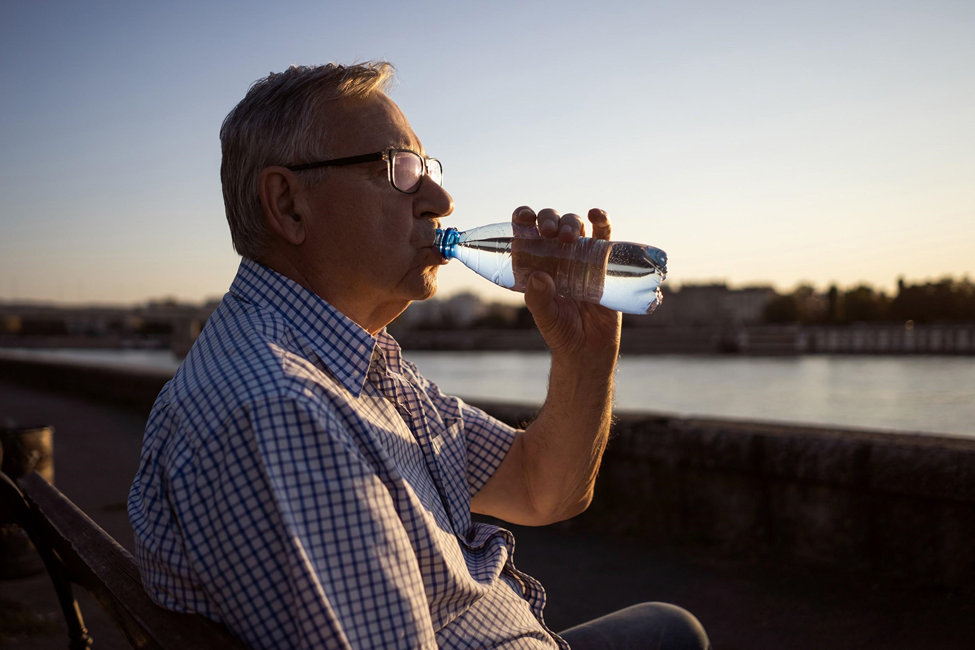The Effects Of Dehydration On The Body

The Effects of Dehydration on the Body
We all know that water is good for us, but the effects of dehydration are actually much more serious than many people realise. Ensuring you’re sufficiently hydrated is a critical aspect of managing your health, cognition and overall wellness. After all, our bodies are made up of 60% water!
Like it or not, we’re basically cucumbers with complicated feelings and jobs.
What is dehydration?
Before we get into the nitty gritty, let's first find out what dehydration actually means. It’s a word that gets thrown around quite a lot, but dehydration refers specifically to the result of excessive water loss - often defined as a loss of more than 2% of your bodily fluids.
Loss of fluids is a completely normal element of natural bodily function and occurs every day through sweating, peeing and more, but it’s when those lost fluids aren’t replaced that issues can arise. When your body is dehydrated, it doesn’t have enough water to carry out its normal functions, meaning it can struggle to operate as usual, resulting in the side effects that are commonly associated with dehydration.
Now that you know what dehydration actually means, grab yourself a cold one (water, that is) and take a look at all of the weird and (not so) wonderful things your body gets up to when it doesn’t have enough of the cool, blue stuff.

How does dehydration occur and who is most at risk?
The leading causes of dehydration are excessive sweating, some medications (such as diuretics or antihistamines), stomach bugs that cause vomiting and diarrhoea, and simply not drinking enough fluids throughout the day.
We really should be drinking around eight glasses of fluid a day - and no-added-sugar squash, tea and coffee (without sugar!) and low fat milk all count towards your daily intake. So there’s really no excuse!
Those most at risk of dehydration include people reliant on others for their fluid intake (such as children and the elderly), people with physical disabilities or chronic illnesses (such as diabetes, kidney diseases and Alzheimer’s) and anyone who exercises vigorously in hot conditions.

What does dehydration do to the body?
Dehydration affects our body, our mind and even our good looks! It can cause muscle cramps, excess sugar cravings (which can lead to weight gain), brain fog, dull skin, low blood pressure, sunken eyes - the list goes on!
How, exactly? Well, since our body is made up of around 60% water, it understandably plays a central role in regulating all sorts of bodily functions including protecting organs, flushing out waste and toxins, and carrying nutrients and oxygen around the body. When our hydration levels drop and we become dehydrated, your body has limited resources to perform these regular functions, which can lead to depleted levels of sodium and electrolytes and, in turn, physical and cognitive issues.
Symptoms of dehydration
The effects of dehydration on the body can lead directly to adverse symptoms, but these often present differently depending on a range of factors including your age, general health, and how dehydrated you are. Be on the lookout for any of the following symptoms in yourself or a person in your care:
In adults
- Extreme thirst
- Less frequent urination
- Dark-colored urine
- Fatigue
- Dizziness
- Confusion
In children
- Dry mouth and tongue
- Crying without tears
- No wet nappies over three hours
- Sunken eyes and cheeks
- Sunken soft spot
- Lack of energy or irritability

Potential serious consequences
The symptoms of dehydration are our warning sign that something isn’t right but, left untreated, dehydration can have more serious consequences.
Ongoing unaddressed dehydration can result in a range of serious health problems including:
- Urinary tract infections (UTIs)
- Kidney infections
- Seizures and muscle contractions
- Loss of consciousness
- Heat exhaustion
That’s why it’s so important to act on the early symptoms of dehydration when they present – if you don’t rehydrate relatively quickly, you run the risk of much more serious complications.
How to prevent dehydration
Dehydration can affect the body quickly, so the best approach to tackling it is to work towards preventing it occurring in the first place. Knowing how to prevent dehydration is particularly important in the hotter months of the year, when hydration levels can drop more rapidly.
You can easily prevent dehydration by ensuring you practice regular hydration - especially in hot weather or after exercise. Aim to drink around eight glasses (or two litres) of fluid per day and ensure that you pay extra attention to rehydrating after sweating or suffering with vomiting and/or diarrhoea.
If you experience any mild symptoms of dehydration, rehydration should be enough to relieve them. However, if you suspect that you or somebody in your care is suffering from the effects of extreme dehydration then contact a medical professional immediately.
Now you know the dangers of dehydration, what are you waiting for? Pour yourself a nice cool glass of water and get your water intake to where it should be.
Recent posts
- How Coaching Can Support ADHD: Exploring Options Beyond The NHS
- Understanding ADHD Assessments: What To Expect During Diagnosis
- What Are The 4 Stages of COPD?
- What is Musculoskeletal Physiotherapy?
- What Are The Most Important Health Screenings For Men?
- What Are the Most Important Health Screenings for Women?
- What are the Benefits of Vitamin B12 Injections?
- Can A Chiropractor Help With Sciatica?
- Unlocking the Truth About Private Healthcare
- Is my portion size correct?

